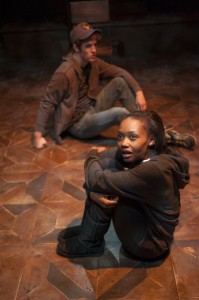ALMOST A FULL MOON
The theater has been sorely affected by electronic communication. Since the advent of the internet, at least, the cumbersome amount of news bits and twittering has infected storytelling like a cancer. Modern playwrights must be so caught up in instant missives and self-promotion on Facebook (or some such nonsense) that even 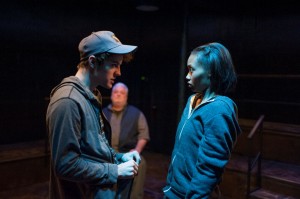 when a modern play has an interesting story, it is usually rife with a sterile and unimaginative use of language. This is why it’s easy to sit up and take notice of David Greig, whose Yellow Moon: The Ballad of Leila and Lee (2006) opened at Writers’ Theatre last night. As with his The Strange Undoing of Prudencia Hart (see S&C’s review of Chicago Shakespeare’s 2012 production here), the prolific Scottish playwright proves that he is both an original storyteller and a crafty wordsmith (he also did an astounding job adapting Strindberg’s Creditors (2008); see S&C’s review of Remy Bumppo’s current production here).
when a modern play has an interesting story, it is usually rife with a sterile and unimaginative use of language. This is why it’s easy to sit up and take notice of David Greig, whose Yellow Moon: The Ballad of Leila and Lee (2006) opened at Writers’ Theatre last night. As with his The Strange Undoing of Prudencia Hart (see S&C’s review of Chicago Shakespeare’s 2012 production here), the prolific Scottish playwright proves that he is both an original storyteller and a crafty wordsmith (he also did an astounding job adapting Strindberg’s Creditors (2008); see S&C’s review of Remy Bumppo’s current production here).
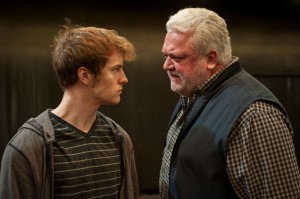 Yellow Moon, about two youths running from the law in present day Scotland, has a Dickensian adventure feel to it, as fascinating characters pop in and out to feed the story. The structure is akin to David Edgar’s eight-and-a-half hour adaptation of The Life & Adventures of Nicholas Nickleby (1980), in that Mr. Greig employs actors as narrators and annotators to move the plot along. While this can usually feel like a tricky shortcut as a way to avoid the more difficult task of character development through dialogue, the action is told through poetic, innovative and powerful language. The narration is cleverly distributed not by the playwright, but the company and its leader – in this case, Associate Artistic Director Stuart Carden, who uses the tiny Books on Vernon space to full effect.
Yellow Moon, about two youths running from the law in present day Scotland, has a Dickensian adventure feel to it, as fascinating characters pop in and out to feed the story. The structure is akin to David Edgar’s eight-and-a-half hour adaptation of The Life & Adventures of Nicholas Nickleby (1980), in that Mr. Greig employs actors as narrators and annotators to move the plot along. While this can usually feel like a tricky shortcut as a way to avoid the more difficult task of character development through dialogue, the action is told through poetic, innovative and powerful language. The narration is cleverly distributed not by the playwright, but the company and its leader – in this case, Associate Artistic Director Stuart Carden, who uses the tiny Books on Vernon space to full effect.
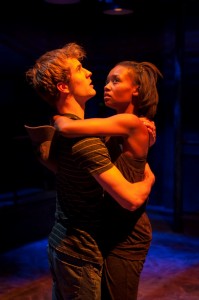 Lee (Josh Salt), a belligerent 17-year-old whose pa marooned the family long ago, receives little devotion from his erratically alcoholic ma and plenty of anguish from her condemning boyfriend. Leila (Ashleigh LaThrop) is a vulnerable adolescent obsessed with celebrity magazines; she is a refugee of war from another country, a social misfit, and barely mumbles a word; one of the ways she feels life profoundly is by cutting herself. The two troubled souls meet at a superstore, and Lee’s cockiness mesmerizes Leila, even as she sees through his bravado.
Lee (Josh Salt), a belligerent 17-year-old whose pa marooned the family long ago, receives little devotion from his erratically alcoholic ma and plenty of anguish from her condemning boyfriend. Leila (Ashleigh LaThrop) is a vulnerable adolescent obsessed with celebrity magazines; she is a refugee of war from another country, a social misfit, and barely mumbles a word; one of the ways she feels life profoundly is by cutting herself. The two troubled souls meet at a superstore, and Lee’s cockiness mesmerizes Leila, even as she sees through his bravado.
When the mom’s boyfriend gets into a fight with Lee, it ends in a rush of violence which forces Lee and Leilah to hightail it to the highlands, where Lee believes his absentee father may be living. They end up with the alcoholic caretaker of a lodge, who suspects they are on the lam and uses them to his advantage.
The play is a well-staged flurry of activity up to this point, but wisely slows down as characters are fleshed-out a bit. The theatrics are quite exciting in such close in-the-round proximity, aided to a great extent by Lee Fiskness’ subtle lighting and 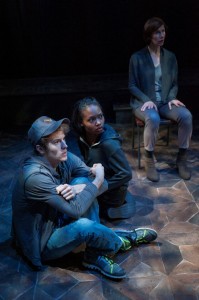 Christopher Kriz’ original music and sound design. Mr. Salt embodies the fidgety, misunderstood Lee, making the character hypnotic and captivating; anyone would follow this broken down Peter Pan when he says, “Do you wanna come, or do you wanna come?” John Lister has a powerhouse presence as the drunken caretaker, and his masterful Scottish brogue far surpasses those of his castmates. Ms. LaThrop has a magically wistful presence, but her dialect was practically nonexistent to the point of distraction; I look to dialect coach Eva Breneman to explain this egregious occurrence. As Lee’s mom and other characters, Karen Janes Woditsch may waver in the dialect department, but she brings pathos as Lee’s mom, and much-needed comedy to the role of a Reality TV celebrity who happens upon Leilah while she swims in a lake. (I must admit gratitude for the faulty dialects – had they been authentic Scottish brogue, American audiences would probably lose every other word.)
Christopher Kriz’ original music and sound design. Mr. Salt embodies the fidgety, misunderstood Lee, making the character hypnotic and captivating; anyone would follow this broken down Peter Pan when he says, “Do you wanna come, or do you wanna come?” John Lister has a powerhouse presence as the drunken caretaker, and his masterful Scottish brogue far surpasses those of his castmates. Ms. LaThrop has a magically wistful presence, but her dialect was practically nonexistent to the point of distraction; I look to dialect coach Eva Breneman to explain this egregious occurrence. As Lee’s mom and other characters, Karen Janes Woditsch may waver in the dialect department, but she brings pathos as Lee’s mom, and much-needed comedy to the role of a Reality TV celebrity who happens upon Leilah while she swims in a lake. (I must admit gratitude for the faulty dialects – had they been authentic Scottish brogue, American audiences would probably lose every other word.)
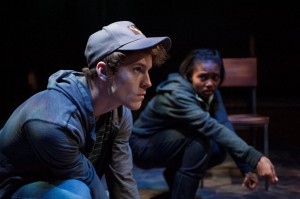 There is much to admire about both script and production. I thoroughly enjoyed the theatricality of it all and the many nuances, such as when narrators took on the personalities of the character which they spoke about, but I couldn’t shake the feeling that Yellow Moon would be far less effective in any space bigger than the back of a bookstore. This is theater that belongs at a Fringe Festival; for me, the manic goings on tend to get a bit one-note, even at a 75-minute running time. This isn’t theater that delves into the souls of characters, it’s a thrill ride. Mr. Greig may be a clever ink slinger and fabulist, but the show’s device occasionally overrides the drama.
There is much to admire about both script and production. I thoroughly enjoyed the theatricality of it all and the many nuances, such as when narrators took on the personalities of the character which they spoke about, but I couldn’t shake the feeling that Yellow Moon would be far less effective in any space bigger than the back of a bookstore. This is theater that belongs at a Fringe Festival; for me, the manic goings on tend to get a bit one-note, even at a 75-minute running time. This isn’t theater that delves into the souls of characters, it’s a thrill ride. Mr. Greig may be a clever ink slinger and fabulist, but the show’s device occasionally overrides the drama.
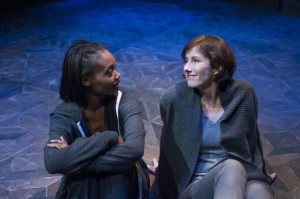 I also craved to see some characters given more stage time: A guidance counselor, the vacationing celebrity, Lee’s depressed mother, et al, spend little time in the story but the theater is electrified when they are on stage; ultimately, they serve more as a footnote to Lee’s journey, when they could have been fleshed-out more. Also, the play’s conclusion is strained and contains a scandalous turn of events that is somewhat tough to swallow; while some in the audience shed a tear, I am not a fan of obvious symbolism and shock value. Still, there’s a sort of purposeful vagueness that I found appealing, and the evening’s emotional veracity cannot be denied.
I also craved to see some characters given more stage time: A guidance counselor, the vacationing celebrity, Lee’s depressed mother, et al, spend little time in the story but the theater is electrified when they are on stage; ultimately, they serve more as a footnote to Lee’s journey, when they could have been fleshed-out more. Also, the play’s conclusion is strained and contains a scandalous turn of events that is somewhat tough to swallow; while some in the audience shed a tear, I am not a fan of obvious symbolism and shock value. Still, there’s a sort of purposeful vagueness that I found appealing, and the evening’s emotional veracity cannot be denied.
Yellow Moon
Writers’ Theatre in Glencoe
scheduled to end on August 4, 2013
EXTENDED to July 14, 2013
for tickets, call 847-242-6000
or visit http://www.writerstheatre.org
for info on this and other Chicago Theater,
visit http://www.TheatreinChicago.com

